
You always remember the delicacy of the work you do on a new play
You always remember the delicacy of the work you do on a new play - the delicacy and the rigor and the courage.






"You always remember the delicacy of the work you do on a new play — the delicacy and the rigor and the courage." — Lindsay Duncan
Thus spoke Lindsay Duncan, the actress of depth and discipline, whose words echo not only through the theater but through every realm of human creation. In her reflection lies the wisdom of the artist’s path — a road paved not with certainty, but with delicacy, rigor, and courage. She speaks of what it means to breathe life into something new, to stand before the unknown and shape it with trembling hands. For every act of creation — whether of art, of love, or of truth — demands this sacred trinity: the tenderness to listen, the discipline to persist, and the bravery to risk failure.
When she speaks of “the delicacy of the work,” she reminds us that creation is not brute force, but fine craft. To create something new is to hold life’s fragility in one’s hands — to listen deeply to the pulse of what wants to emerge. The artist, like a gardener, must be gentle; too heavy a hand, and the bloom is crushed. The playwright’s words are living things, and the actor’s role is to nurture them into being, balancing between interpretation and surrender. This delicacy is not weakness, but wisdom — the understanding that the most powerful truths often arrive softly, and must be handled with reverence.
Yet, alongside delicacy comes rigor — the unyielding discipline that gives form to inspiration. No great creation, no masterpiece, ever emerged from ease. Lindsay Duncan, through her long years upon the stage, knew that art demands precision as much as passion. The artist must labor, must refine, must return again and again to the work, stripping away vanity and error until only truth remains. This rigor is the spine of beauty — the structure upon which delicacy can rest. Without discipline, sensitivity dissolves into chaos; without effort, inspiration fades into dream. The balance of these two — gentleness and strength — is the mark of mastery, and the heart of all great work.
But above both stands courage, the most essential of all. To create — truly to create — is to expose the soul. It is to stand before others, naked in vulnerability, and say, “This is what I believe, this is what I see.” It is to face doubt, rejection, and misunderstanding, and yet continue. In Lindsay Duncan’s words, the artist remembers this courage not as pride, but as necessity — the flame that allows the work to exist at all. Every new play, every new creation, begins in uncertainty. The artist does not know if it will fail or fly, but must leap regardless. For courage is not the absence of fear — it is the will to act despite it.
This truth extends far beyond the theater. The same delicacy, rigor, and courage are demanded of every soul who dares to build something meaningful — a teacher shaping young minds, a scientist exploring uncharted truths, a parent raising a child, or a leader guiding through storm. Each of these, too, is a “new play” in the theater of life. They require the gentleness to understand others, the strength to persevere through challenge, and the bravery to stay true when the outcome is unknown. Courage without wisdom destroys; rigor without compassion hardens; delicacy without persistence fades. But united, they create the harmony of greatness.
Consider the example of Leonardo da Vinci, who embodied all three. His inventions and paintings sprang from delicacy — the patient observation of nature’s hidden rhythms; from rigor — the countless hours of sketches, corrections, and study; and from courage — the audacity to see the world differently, to defy the limits of his time. His masterpieces, like The Last Supper and Mona Lisa, were not merely acts of genius, but acts of faith: faith in the unseen potential of an idea, faith that beauty is worth the struggle. Every artist, every visionary, must walk this same path — trembling, striving, daring.
So, my listener, take this teaching to heart. Whatever your craft, whatever your calling, treat it with delicacy — for every idea, every relationship, every dream is fragile. Approach your work with rigor, for excellence demands discipline. And above all, walk with courage, for creation always carries risk — the risk of failure, of judgment, of the unknown. But remember: the one who dares to create, who dares to step into the light, becomes a vessel of truth.
For in the end, as Lindsay Duncan teaches, the memory that remains is not of the applause, but of the process — the delicate balance of fear and faith, of doubt and devotion. It is the courage to begin again, each time with trembling hands and an unbroken heart. This is the true legacy of all creators: to labor with delicacy, to strive with rigor, and to live with courage — for in doing so, one brings forth light from the darkness, and gives the world a piece of one’s own immortal soul.






AAdministratorAdministrator
Welcome, honored guests. Please leave a comment, we will respond soon